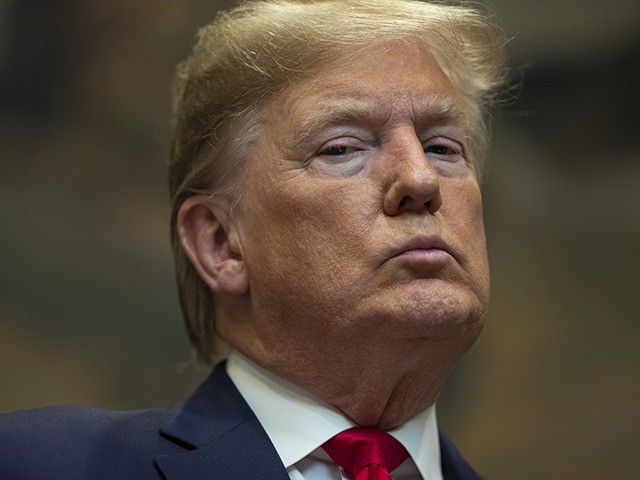A spokesman for Iran’s courts announced lawsuits against President Donald Trump and the American armed forces generally in the Iranian legal system for the elimination of the nation’s terror chief Qasem Soleimani.
A U.S. airstrike removed Soleimani, head of the Islamic Revolutionary Guard Corps (IRGC) Quds Force, and the head of Iraq’s Hezbollah Brigades Abu Mahdi al-Muhandis from the battlefield this month. As Quds Force chief, Soleimani led Iran’s international colonial efforts and orchestrated dozens of terrorist attacks — including IED attacks on American soldiers — to expand Iran’s influence. Soleimani played a large role in attacks on civilians in Syria, helped the Shiite Houthi rebels in Yemen illegally seize power, and offered support to Iran’s socialist allies in Venezuela and throughout Latin America.
American officials, including Trump, have repeatedly stated they had intelligence suggesting Soleimani was planning “imminent” attacks on Americans in Iraq, where he spent most of the end of his life helping Baghdad target and kill civilian protesters.
Gholamhossein Esmaeili, spokesman for the Iranian Judiciary, told reporters Tuesday that the targeted strike against Soleimani was “a terrorist move” and that Trump would face Iranian justice in one of the world’s most notoriously unfair and violent legal systems.
“There is no doubt that the U.S. military has done a terrorist move assassinating IRGC Commander Lt. Gen. Soleimani and Second-in-Command of Iraq Popular Mobilization Units (PMU) Abu Mahdi al-Muhandis … and Trump has confessed doing the crime,” Esmaeili said, according to Iran’s Mehr news service. “The firmest reason for accusing an individual is his confession.”
Esmaeili said that Iranian officials would “initially file a lawsuit in Iran, which is legal under the Islamic Penal Code.” He did not specify what redress the Iranian state would seek in that lawsuit, though it would presumably target Washington and the president for “terrorism.”
Terrorism and moharebeh, a related crime roughly translated to “war against Allah,” are punishable by death in the criminal system. Political “crimes,” or acts against the authoritarian regime, also receive brutal punishments. In recent memory, Iran sentenced a female human rights lawyer to 148 lashes and 38 years for defending a woman’s right not to wear hijab, which is mandatory in Iran. Iran only made it legal for defendants facing political charges to choose their own lawyers in 2014; two years later, Human Rights Watch found the nation routinely denying that right to the accused. Those sentenced face torture and inhumane conditions at political prisons like Evin, where survivors say as many as 200 prisoners are often forced to use five bathrooms. Evin Prison is under U.S. sanctions.
The Iranian official did not make clear if the lawsuit in Iranian court would be a private one on Soleimani’s behalf or a suit by a prosecutor under criminal law. “Then we will do the same in Iraq and Hauge [sic] Court against Trump and the U.S. military,” he added, according to Mehr.
Esmaeili presumably meant taking Trump to the International Criminal Court at The Hague, where individuals can face prosecution for either war crimes or crimes against humanity. Public speculation surrounding the airstrike on Soleimani has centered around the question of a potential imminent attack on American troops.
“In the Soleimani case, the U.S. is claiming it acted in self-defense to prevent imminent attacks, a category of action which, if in fact true, is generally seen as being permissible under the U.N. Charter,” Dapo Akande, professor of public international law at Oxford University, told BBC in the aftermath of the airstrike.
An Iranian legal case against Trump over the Soleimani airstrike follows Tehran admitting to shooting down a Ukrainian commercial airliner with a Russian surface-to-air missile last week as the plane departed Tehran’s international airport. The plane had taken flight as Iran began a ballistic missile attack on Iraqi airbases in response to the Soleimani assassination and, according to Iranian officials, “human error” caused an Iranian soldier to mistake the plane for an American missile.
The admission followed days of Iranian officials insisting it was “obvious” that a missile did not hit the commercial airliner and that Iran had evidence suggesting the plane spontaneously combusted.
Iran’s parliament branded the admission of guilt after intense international pressure “heartwarming” on Sunday.
On Tuesday, President Hassan Rouhani blamed the United States for the fallen plane.
“Today, the U.S.’ interference in other countries’ affairs is crystal-clear as well as its supports for dominating oil wells in Syria,” he insisted. “The root of all sorrows goes back to America … this cannot be a reason for us not to look into all the root causes.”

COMMENTS
Please let us know if you're having issues with commenting.